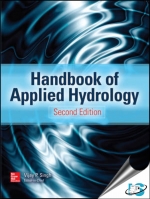Tab Article
Fully Updated Hydrology Principles, Methods, and Applications
This industry-standard resource has been completely revised for the first time since Ven Te Chow's classic edition was published over 50 years ago. Compiled by a colleague of the late Dr. Chow and featuring chapter contributions from a “who’s who” of international hydrology experts, Handbook of Applied Hydrology, Second Edition, covers scientific and engineering fundamentals and presents all-new methods, processes, and technologies. Complete details are provided for the full range of ecosystems and models. Advanced chapters look to the future of hydrology, including climate change impacts, extraterrestrial water, social hydrology, and water security.
Handbook of Applied Hydrology, Second Edition, covers:
- The Fundamentals of Hydrology
- Data Collection and Processing
- Hydrology Methods
- Hydrologic Processes and Modeling
- Sediment and Pollutant Transport
- Hydrometeorologic and Hydrologic Extremes
- Systems Hydrology
- Hydrology of Large River and Lake Basins
- Applications and Design
- The Future of Hydrology


